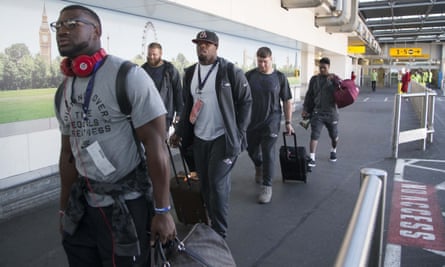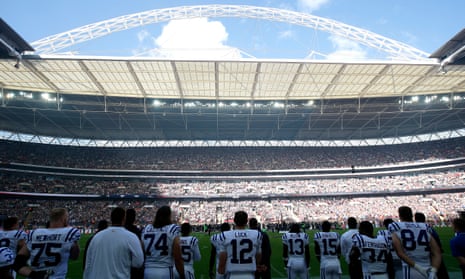Ten years after the NFL first came to London the league remains hopeful of putting a team in the city. Perhaps as soon as in four years. “I said this was a 15-year project when we started in 2007, that was the sort of timeframe that seemed to work,” Mark Waller, the NFL’s executive vice-president of international and events, said. “The next four or five years should be very doable.”
A lot has to happen for the league to place a full-time franchise in the UK. Most importantly, the owner must want to move his team to London and the other owners would need to agree that such a move is a good idea. But there is a definite sense the NFL is pushing harder on its experiment to test whether American football can work in London.
While expanding the league internationally has been a priority of the commissioner, Roger Goodell, the NFL had to first place a team in the long-empty Los Angeles market before it could address London.
Filling LA was a laborious, two-decade process that appeared to stall several times before the league allowed the St Louis Rams to move there in 2016 and the San Diego Chargers to do so this year. After the Rams move, several owners and league officials said they were ready to focus on a UK team.
“If you look at what happened with LA it’s a good indication that things won’t move at all and then they will move very quickly,” Waller said. “We want to be sure London is ready and we have a fan base and this is something we can do. With LA it was: wait, wait, wait and suddenly go.”
Can the NFL suddenly go after years of slowly building its presence in London? It seems possible. Last year the league played three games in one month in two different stadiums – Wembley and Twickenham – replicating, in a way, a regular month during the season for a home market. This season they have games in consecutive weeks at Wembley and Twickenham, hoping to gauge fan interest and the feasibility of playing games on consecutive weeks in various venues.
While league officials remain encouraged by the regular sellouts of their London games, including all four this year, they want to play as many as eight games – matching a team’s regular season home schedule – before making a decision. That way, the games will hardly be considered a novelty any more for fans in the UK and US, giving the league a true gauge of the market.
It may be hard to schedule eight games, however. Already the NFL seems committed to playing a game each year in Mexico as well as a 2019 game between the Rams and San Francisco 49ers in China. Finding enough teams willing to give up home games so the league can fill an eight-game slate in London may be challenging.
The international games are not popular with many American fans and several teams have leases on expensive stadiums that say they must play eight home games a year in those facilities.

The NFL has passed two resolutions in recent years to push more games out of the US. One forces teams in the middle of relocations – the Rams, Chargers and Oakland Raiders (
who are moving to Las Vegas) – to play an international game in each year before they move into permanent new homes. The other says that Super Bowl hosts must also play an international game within five years of landing the game.
Waller called the eight-game plan “a helpful data point” but added it is “not on the front burner”, meaning the league may never be able to play that many games in London before making a decision on a UK franchise. When asked if he as optimistic a team can be placed in London, Waller said “yes”. “I don’t think there is any other sport that can do this with scheduling and logistics,” he added. “I think the thing for me is that it feels like we are an authentic part of the sporting calendar in London.”
Privately, league officials are encouraged by the large crowds at both the London games and at fan events. Last year, one top executive scrolled through photos on his phone to show a Guardian reporter pictures of the league-themed street fair in Regent Street taken the day before one game. What surprised him most, he said, was the number of British people he encountered that day. “Not all of those were ex-pats,” he said.
NFL executives have also worked hard to convince teams that travelling to London will not be a significant disruption. In the early years of the UK experiment, the teams who went overseas were given byes the following week as a way of decompressing.
This year, three of the eight teams who play in London will play the next week – including the Baltimore Ravens and Jacksonville Jaguars who play at Wembley on Sunday. Baltimore, in fact, will play their bitter rivals the Pittsburgh Steelers the following Sunday, perhaps as strong a test as any about a team’s ability to play the week after going to the UK.
“Teams are less nervous about the schedule disruptions,” Waller said. Getting coaches and players to see travelling to London as no different than going to, say, Seattle might yet be the most critical piece in moving a team to the UK.

Comments (…)
Sign in or create your Guardian account to join the discussion